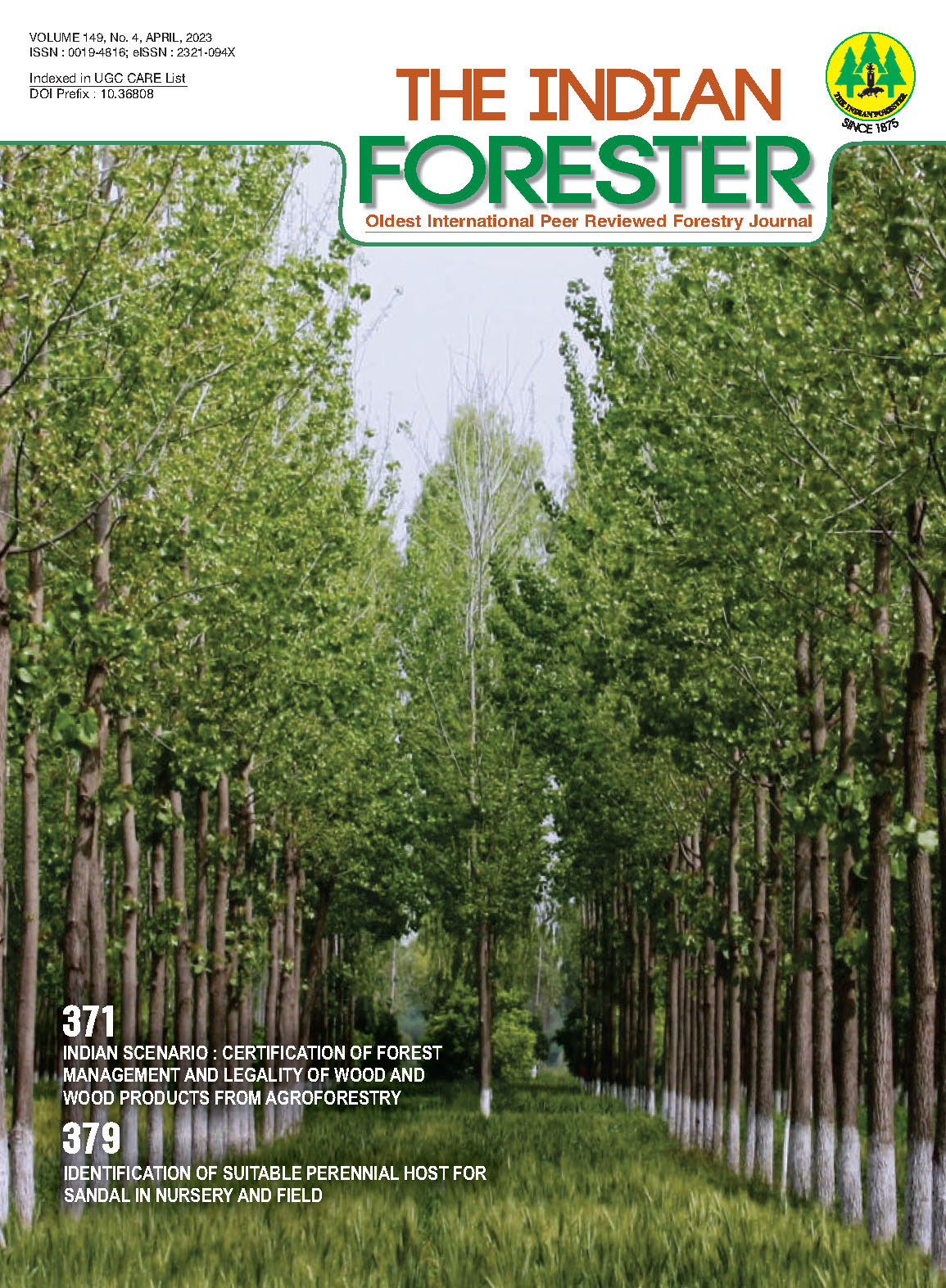Indian Scenario : Certification of Forest Management and Legality of Wood and Wood Products from Agroforestry
DOI:
https://doi.org/10.36808/if/2023/v149i4/169665Keywords:
Forest Certification, Sustainable Forest Management (SFM), Agroforestry in India.Abstract
Growing concern about sustainable forest management vis-Ã -vis deforestation especially in tropical countries has led to the introduction of market mechanism known as Forest Certification. It ensures customers of the forest products that, items they purchase have been originated from sustainably managed forest areas. International certifying agencies have laid down the principles /standards for forest certification which are generally suited for large privately managed forests and it would also add considerable amount to the cost of timber production. Therefore, it acts as a trade barrier especially to the export-oriented wood-based industries of developing countries. In Indian context, around 90 per cent of the raw material (timber) for these industries is supplied by agroforestry sector which is contrary to other timber exporting countries. The forest areas in India are sustainably managed by the government, based on the provisions of approved working plans. Therefore, in this paper, it is propounded that India should have its own framework of forest certification based on the Criteria-Indicators developed through Bhopal India process and separate certification standards should be developed for the farm grown wood to ensure 'due diligence' in proving its legality and thereby boost agroforestry and income of small and marginal farmers.References
Cashore B.W., Auld G. and Newsom D. (2004). Governing through Markets: Forest Certification and the Emergence of Non-State Authority; Yale University Press: New Haven, CT, USA.
Chen J., Wang L., Li L., Magalhaes J., Song W., Lu W., Xiong L., Chang W. and Sun Y. (2020). Effect of Forest Certification on International Trade in Forest Products. Forests, 11: 1270.https://doi:10.3390/f11121270.
European Commission (2011). Buying Green: A Handbook on Green Public Procurement, European Union. Luxembourg. pp. 76.
FERN. (2004). Footprints in the forest: current practice and future challenges in forest certification. Available from http://www.fern.org (accessed 4 September 2005).
Fernholz K., Bowyer J., Erickson G., Groot H., Jacobs M., McFarland A. and Pepke E. (2021). Forest Certification Update 2021: The Pace of Change. Dovetail Partners. Accessed on June 9, 2021.
Food and Agricultural Organisation (FAO). (2000). Certification and forest product labelling: A review. Available from http:www.fao.org (accessed 20 January 2003).
Food and Agricultural Organisation (FAO). (2001). State of the World's Forests 2001. Rome: FAO.
Food and Agricultural Organisation (FAO). (2003). State of the World's Forests 2003. Available from http:www.fao.org (accessed 15 November 2003).
Forest Stewardship Council (FSC). (2002). Forest Stewardship Council: Because forests matter. Available from http://www.fscoax/org (accessed 2 September 2002).
Forest Stewardship Council (FSC). (2003). Forest Stewardship Council: Setting the standard for responsible forestry. Available from http://www.fscoax.org (accessed 13 February 2003).
FSC Facts and Figures. Available online: (https://fsc.org/en/facts-figures#archive).
Garzon A.R.G.., Pete B., Jacek S., Jesse A., Chris C., Kevin B., Bin M., Hayati Z. and Ahmet Y. (2020). A Comparative Analysis of Five Forest Certification Programs. Forests, 11(8): 863: 1-21.
Hain H. (2005). Social, ecological and economic impacts of forest certification: Case study of FSC Certified Estonian State Forest Management Center MSc thesis. Department of Biology and Geography. University of Tartu. pp. 115.
Malaysia Timber Certification Council (MTCC). (2002). MTCC Timber Certification Scheme Promoted in Europe. Available from http://www.mtcc.com.my/activities/index.html (accessed17 February 2003).
Malaysia Timber Certification Council (MTCC). (2003). Danish Government accepts MTCC scheme. Available from http://www.mtcc.com.my/latest_news/index.html (accessed 15 December 2003).
PEFC. (2004). PEFC announces public consultation on Australian Forest Certification Scheme. Available from http://www.pefc.org (accessed 12 September 2004).
PEFC Facts and Figures. Available online: (https://pefc.org/discover-pefc/facts-and-figures).
Perera P. and Vlosky R. (2006). AHistory of Forest Certification. Louisiana Forest Products Development Center Working Paper 71. pp. 14.
Rametsteiner E. (2000). Sustainable forest management certification: Frame conditions, system designs and impact assessment. Ministerial Conference on the Protection of Forests in the Europe Press, University of Minnesota, European Commission + 200 pp.
Rametsteiner E. and Simula M. (2003). Forest certification-an instrument to promote sustainable forest management? Journal of Environmental Management, 67: 87-98.
Stringer, C. (2006). Forest certification and changing global commodity chains. Journal of Economic Geography, 6: 701–722. Stringer L.C., Dougill A.J., Fraser E., Hubacek K., Prell C. and Reed M.S. (2006). Unpacking participation in the adaptive management of social–ecological systems: A critical review. Ecology and Society, 11.
Suntana A. (2000). Presentation on behalf of Indonesian Ecolabelling Institute (LEI). Available from http://sfcw.org/mutualrecognition (accessed 3 March 2003).
Teegelbekkers D. (2003). Forest Certification-Experiences with PEFC in Germany United Nations economic commission for Europe. Available from http://www.unece.org/trade/timber/docs/sem-1/papers/r7Teegelbekers.pdf (accessed 6 January 2004).
Wenming L.U. and Muthoo M. (2017). Progress of forest certification in China. Frontiers of Agricultural Science and Engineering, 4(4): 414-420.
Yassin S.M. (2003). Forest and forest product certification and its impact on trade and trade policies Joint UNECE/FAO Roundtable on Trade, Environment and Forests-Working Together for Sustainable Development, 9 July 2003. Available from http://www.unece.org (accessed 6 January 2004).
Downloads
Downloads
Published
How to Cite
Issue
Section
License
Unless otherwise stated, copyright or similar rights in all materials presented on the site, including graphical images, are owned by Indian Forester.





